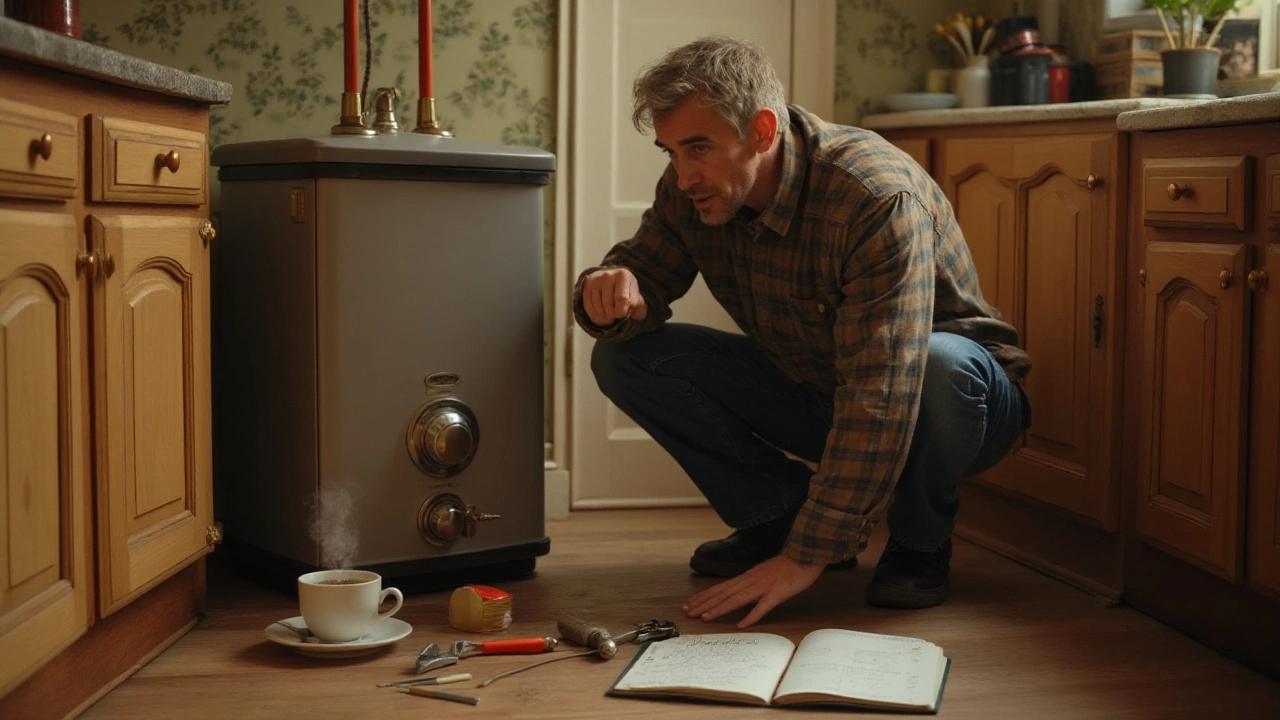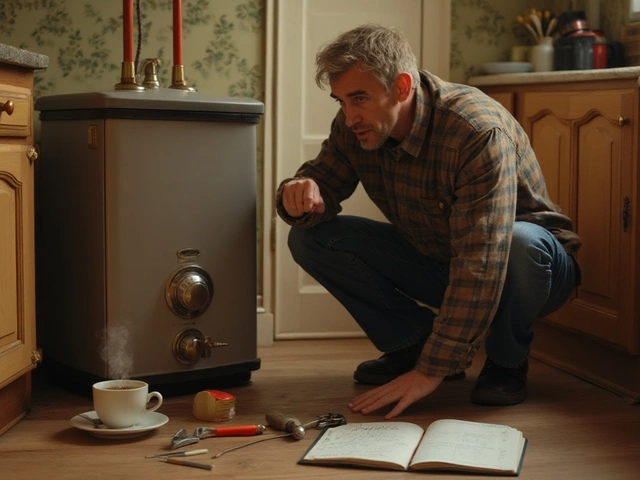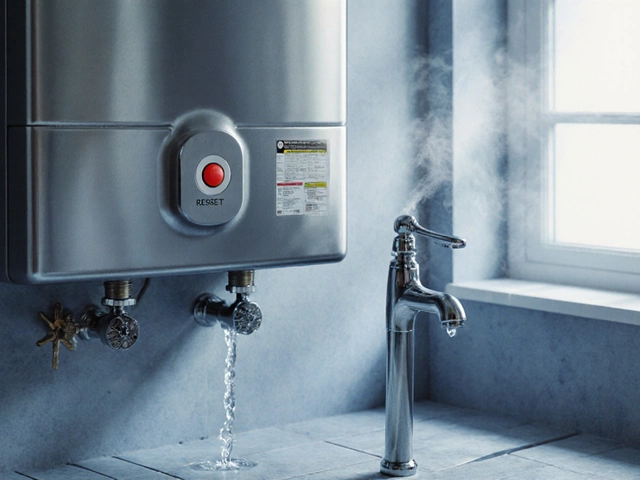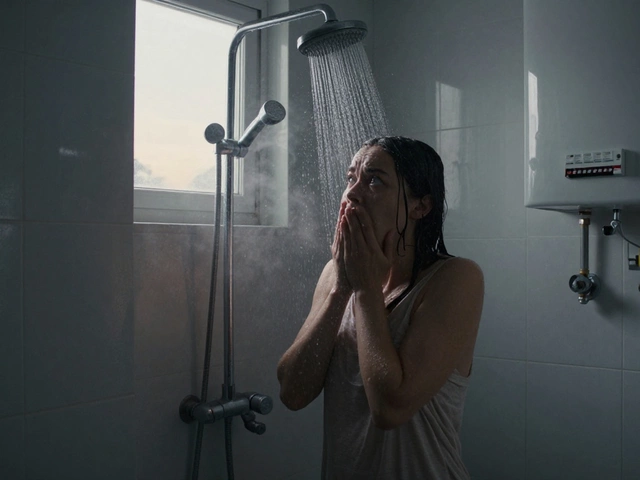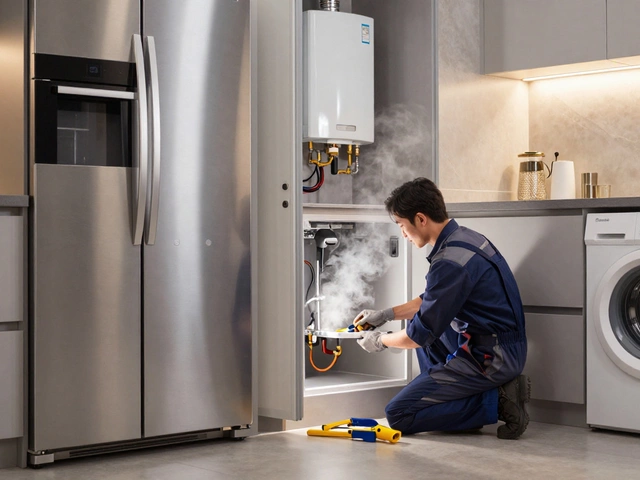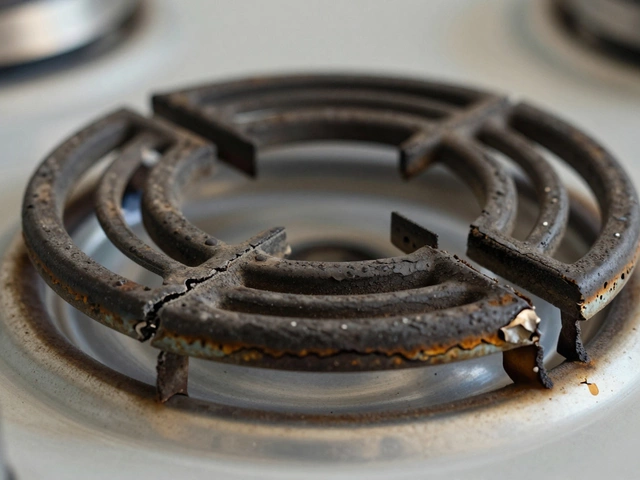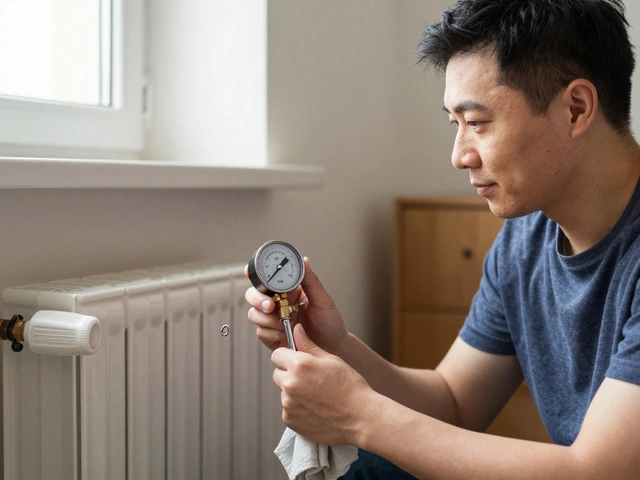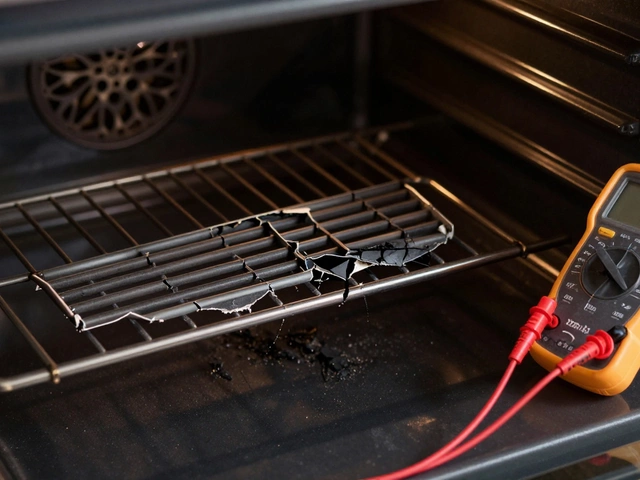Navigating the quirks of household appliances can sometimes feel like a never-ending mystery. Among these, the water heater holds a unique place, often hidden away, until the day it decides to act up. Discovering the need to reset the water heater repeatedly could be a sign of deeper issues.
When your shower turns into an icy surprise, our instinct might tell us to find that nifty reset button and hope for a miracle. But diving into why those frequent resets are becoming a routine task could save you from bigger problems down the line. By understanding the mechanics of this important household gadget, you are empowered to not only fix the issue but prevent it from resurfacing.
- Understanding the Reset Button
- Common Causes for Constant Resetting
- Potential Risks of Frequent Resets
- Maintenance Tips for Consistent Performance
- When to Call a Professional
- Signs You Might Need a New Water Heater
Understanding the Reset Button
The reset button on your water heater is more than just a magic wand for fixing every hiccup. It's an essential safety feature wired into your appliance to prevent overheating, which can be a real hazard. When your water heater's thermostat fails to regulate the temperature properly, the water can heat up beyond safe levels. This is where our little hero – the reset button – steps in. It cuts off the power to your heater, ensuring none of your pipes burst and you don't get scalded by dangerously hot water. This nifty safeguard is vital for protection, but relying on it regularly hints at deeper issues that shouldn't be ignored.
Many homeowners may find themselves leaning into this button a tad too often, and while it's a quick fix, it's not the magic that your hot water issues demand long-term. The underlying causes for a tripped reset button could be as benign as sediment buildup affecting heat transfer or as severe as a malfunctioning thermostat. If left unchecked, a simple fix could spiral into significant damage. You may notice your energy bills climbing, or worse yet, an entirely non-functional heater. That's why understanding the role and reason behind the use of the reset button is crucial.
Your heater's thermostat is not just a single component but a dual-device setup, equipped with both an upper and a lower thermostat. These work in tandem to ensure every drop of water gets heated just the right amount. When something fails, it's possible one of these components isn't playing its part. An insightful quote from HVAC expert James Valdes reminds us,
'Regular resets mean your device is crying out for help. It's wise to listen before the whispers turn into shouts.'His words underline the importance of paying attention to these signs to prevent more substantial problems. Addressing the reasons behind those resets can make life easier without needing to call in the repair cavalry frequently.
Now, there might be some curiosity around whether it's a job fit for a DIY enthusiast or demands the trained eye of professionals. For troubleshooting, inspecting your thermostats and the associated wiring could hint at what's leading to this frequent need for a water heater reset. Ensuring the wiring isn't frayed or coming loose is always a safe start. Proper maintenance, like bi-annual sediment flushing, can deter many common issues that push the reset button's limits. However, if wires, thermostats, or breakers seem operational, it's wise to call a certified technician to delve deeper into potential electrical troubles that aren't visible on the surface. Your safety should always come first, and these appliances work with high voltage, so leave serious repairs to the experts.
Common Causes for Constant Resetting
When it comes to the world's beloved home water heater, a device that whispers warmth into our daily routines, there's nothing more unnerving than having to hit the reset button more often than hitting snooze on a Monday morning. If your water heater falls into this rebellious habit, it might be waving a red flag at you, signaling trouble brewing beneath the surface. The reasons can vary, with some more insidious than others. A prime suspect in this sleuth is the thermostat. Much like a scatterbrained guardian, if it's sending mixed signals to the heating elements, your water heater could either be overheating or underheating, keeping you at its mercy. This can also lead to the high-limit switch, commonly known as the reset switch, tripping as a safety measure to stop the element from overheating. Such a safety feature acts like a protective nanny, ensuring your water heater doesn't end up causing harm.
Sediment buildup is another usual suspect. Over time, mineral deposits, often hiding in your water supply, gather at the bottom of the tank, forming an unruly army that insulates the water from the heating elements. As the elements struggle more to heat your water, stress builds, leading to safety measures kicking in more frequently and leaving you standing perplexed in an unexpected icy shower. This sediment siege not only dares the reset button but can also accelerate wear and tear on the heater itself, potentially leading to costly repairs or replacements if left unchecked. As a quick tip, scheduling regular tank maintenance or flushing the tank entirely can thwart this sediment rebellion, prolonging the life and operational bliss of your appliance.
Beyond thermostat woes and sediment troubles, electrical issues also lurk in the realm of reasons for repetitive resets. Loose wiring, corroded connectors, or faulty components can create unpredictable power connections, making the heater's control system act like a temperamental artist. Living in areas with frequent power fluctuations can exacerbate these issues, keeping you on high alert. An electrical fault could not only cut the power supply, tripping your water heater but could also pose a significant safety hazard. Tackling these issues requires a keen eye and sometimes professional intervention to ensure everything is secure and intact. It's not uncommon for professionals to remark, "Your heater's wiring should be like a well-conducted orchestra," highlighting the harmony required for seamless function.
In some situations, the root cause might lie with the heater's age. As with any longstanding companion, years of service eventually bring fatigue. The efficiency degrades, and parts begin to surrender to time's passage. An old water heater frequently deciding it needs a reboot could be its way of telling you it's time to consider a replacement. Remember, each cause not only affects function but also efficiency. Unchecked issues could ramp up energy consumption, burning a hole in your pocket. By identifying these causes promptly, and understanding their impact, you are not just a homeowner but an empowered guardian of warmth.
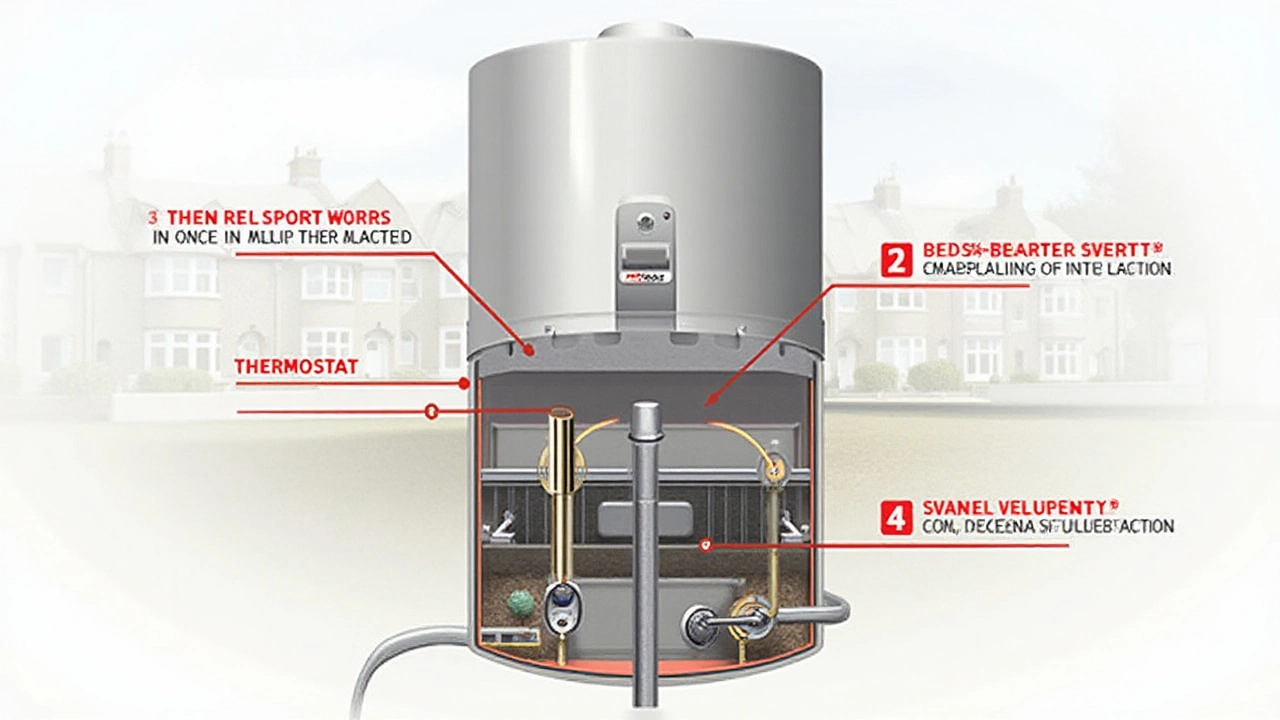
Potential Risks of Frequent Resets
When your water heater becomes too dependent on its reset button, it may be sending a distress signal you shouldn’t ignore. Repeated resetting can indicate various underlying problems, each with its unique set of risks. One critical issue could be a malfunctioning thermostat. If the thermostat is not working correctly, hot water issues can arise, providing inconsistent water temperatures or even overheating the water. Overheating can lead the unit to automatically shut down as a safety measure, preventing potential breakdowns or explosions. Consistently ignoring this issue and opting for a quick fix by resetting can mask a faulty thermostat that needs urgent attention.
Another cause for concern when frequently resetting a water heater is the possibility of sediment buildup. Over time, sediments and minerals can accumulate at the bottom of the tank, impairing the efficiency of the heater and causing it to overwork. This overexertion requires the reset button to come into play more often, trying to recalibrate the system. Such strain not only reduces the heater's lifespan but also increases energy consumption, which might be evident in rising energy bills.
Carl Albrecht, a seasoned plumbing technician, once mentioned, “Neglecting to address sediment buildup is like letting a small leak go unattended. It only gets bigger and costlier with time.”
Paying attention to electrical malfunctions is equally crucial. Frequent resets could signal electrical issues, such as loose connections or faulty wiring. These problems are not to be taken lightly, as they could pose significant safety hazards, including the risk of fire. Ensuring the electrical aspects of your water heater reset are in top condition reduces such dangers. It's essential to remember that, while resetting may seem like a solution, it is only a temporary fix to what might be a perpetual problem.
Subtle signs of hidden issues
While the immediate risk is obvious – losing access to comfortably hot showers – the cumulative effect of repeatedly sidestepping the real issue can lead to costlier consequences down the road. Long-term reliance on resetting can mask deeper issues that eventually require costly repairs or a complete replacement of the heater. Investing time in identifying the reasons behind the resets and possibly calling in a professional can save not only money but also ensure prolonged comfort and safety.Therefore, whenever your water appliance interacts with the world with say, shed the veil of ignorance. Consider it an opportunity to deepen your understanding of its operation. Assessing potential electrical problems early, and managing sediment buildup effectively can keep your water heater running smoothly. More importantly, it prevents the appliance from reaching a point where safety is compromised. Being vigilant about heater safety and acting proactively is always the smarter path to follow.
Maintenance Tips for Consistent Performance
Maintaining your water heater isn't just a one-time task; it's more like a routine check-up to ensure everything is running smoothly, similar to getting your car serviced. It’s crucial for achieving consistent performance and prolonging the life of the appliance. One effective way is to pay attention to sediment buildup. Over time, minerals in your water can settle at the bottom of the tank. This sediment layer affects the efficiency of your water heater, forcing it to work harder, and even contributing to unintended temperature fluctuations. Regularly flushing your tank can drastically minimize this problem and can be done easily without much hassle.
Checking the thermostat settings is another key factor. Many homeowners overlook this simply because it seems to be a set-and-forget component. But thermostats can sometimes change settings unknowingly due to power surges or other reasons. It's a good rule of thumb to keep the thermostat set at around 120°F (49°C) to provide hot water efficiently and reduce the risk of scalding. Moreover, periodic checks for any signs of corrosion or wear on the thermostat itself can reveal potential issues before they become major problems.
Another enticing approach involves giving attention to the sacrificial anode rod. Typically made of magnesium or aluminum, this rod attracts corrosive elements in the water, sparing the inside of the tank. Over time, the rod can corrode to the point it becomes ineffective. Regularly inspecting this component every two years and replacing it if necessary can be vital for extending the water heater's life.
According to John Smith, an industry expert, "Simple routine maintenance can drastically enhance the efficiency and lifespan of your water heater, saving homeowners from costly repairs or premature replacements."Insulation is also a factor that shouldn't be ignored, especially if you live in an area with cold winters. Placing an insulating blanket around your tank can prevent heat loss, leading to more efficiency and reduced energy bills. Similarly, insulating the first few feet of both the hot and cold water pipes attached to the heater can make a meaningful difference.
If you're dealing with frequent resets, you may want to check the power source. Make sure the circuit breaker is functioning properly and hasn't tripped. It's also sensible to inspect the wiring for any frays or disconnections. Sometimes, a loose connection could cause intermittent power issues, compelling you to reset the heater often. Bringing in an electrician for a quick look can mitigate electrical distractions.
Lastly, don’t forget to schedule professional check-ups. While DIY maintenance can solve various issues, having an annual inspection by a certified technician ensures that potential problems are spotted and resolved early. They can recognize signs of wear and tear that might not be apparent and recommend modern upgrades for better efficiency. These keen insights eventually lead to calmer experiences with your trusty old water heater.

When to Call a Professional
There comes a time in every homeowner's journey when they realize that some things are best left to the experts. Your water heater, a silent workhorse tasked with keeping your household warm and cozy, might be sending you subtle signs that it's time to bring in a seasoned pro. But what are those telltale signals? Well, for starters, if you've attempted the basic troubleshooting steps and find yourself resetting the unit with frustrating regularity, it may be a sign of a deeper problem. Sure, it’s easy to convince ourselves to tinker about with wires and buttons, but one misstep could leave you with a cascade of cold moments and increasing repair costs.
Another scenario warranting a call to the professionals is if you notice alarming noises emanating from your water heater. While a gentle humming is quite normal, banging or popping sounds might suggest sediment build-up within your heater's tank. This can impact the efficiency of your unit and potentially lead to damage over time. A professional is equipped with the know-how to flush your tank and restore its smooth operation, ensuring your home's hot water supply is up and running without surprises.
Indicators of Electrical Problems
Now, let's delve into electrical issues. Faulty wiring or a malfunctioning thermostat can turn your water heater from friend to foe. If you suspect such an issue, it’s crucial to act swiftly. Don't let faulty electrics become your learning curve, as this could heighten the risk of electrical shocks or fires. A licensed electrician or qualified heater repair technician can diagnose and fix these problems safely, eliminating risks you might not foresee. Sometimes, cautiousness isn’t just wisdom; it’s a necessity.
"Regular maintenance and a timely call to a professional can extend the life of your water heater by five to ten years," suggests Megan Wood, home appliance expert.
There’s also the issue of age. If your water heater has been loyally serving your home for over a decade, it might be time for a check-up. Older units are more prone to breakdowns, and a professional can assess whether repairs can restore functionality or if replacement is a more viable option. Often, upgrading to a newer, more energy-efficient model could save you money in the long run.
Dealing with Leakage or Rust
Leaky tanks are not just bathroom ankle-deepers; they're warning bells that should never be ignored. A leak can lead to water damage in your home which can be costly to rectify. Sometimes, the culprit could be a loose valve or a crack in the heater. In such cases, prompt professional intervention helps avert further damage. Also, the presence of rust in your water supply is a red flag. It indicates corrosion inside your tank, which if left unattended, could result in irreparable damage. In such instances, a professional's insight is invaluable. They can determine whether a simple fix or a complete replacement is necessary.
The choice of whether to attempt a DIY fix or hire a professional often hinges on the complexity of the problem. For those of us who balance work, family, and the never-ending list of home chores, knowing when to step back and let a professional take over ensures safety and long-term peace of mind. Investing in professional help today might seem daunting, but the future savings in time, money, and comfort make it all worthwhile.
Signs You Might Need a New Water Heater
The trusty water heater is an unsung hero in homes, quietly ensuring those showers are perfect and dishwashers do their job. But like all appliances, water heaters have a shelf life. Recognizing when it's time for a new one can save you from cold showers and worse, unexpected bursts of costly maintenance. One of the first signs is age; if your unit is over a decade old, you might want to start browsing for a replacement. Conventional wisdom suggests water heaters last between 8 to 12 years, though this can vary with quality and maintenance habits.
Rusty water is another red flag. A hot-water stream tinged with orange might suggest corrosion within the tank, a problem not to ignore. Over time, the inner lining can deteriorate, leading to leaks and eventual tank failure. Another telltale sign is the clunking noise coming from the heater's belly. This cacophony often means sediment has settled at the bottom, hardening over time, reducing efficiency, and damaging the heater. If you hear your heater resembling a rock band practice, it's time to act. Relatedly, a reduction in hot water availability signals trouble. If your usual hot shower suddenly shortens, it might mean your heater's nearing the end.
Increasing energy bills can be a stealthy indicator. While prices might fluctuate, if your energy bills persistently rise while your habits haven't changed, your heater might be working overtime. Inefficient heaters tend to consume more electricity or gas. Also, if you find yourself resetting the system habitually, this frequent need can wear out the parts and might indicate underlying problems.
According to Energy.gov, "heating water accounts for about 18% of your home energy use." Inefficiencies can amplify this number significantly.Moreover, leaks and moisture around the heater's base are glaring signs. While minor leaks from fittings and connections can be repaired, tank leaks are more concerning, as they often mean it's replacement time.
In cases of uncertainty, it's wise to consult an experienced technician. They can provide insights and recommend whether a repair is sufficient or a complete change is imminent. If repairs become frequent, evaluate those costs against a new water heater's price. Modern units are often more energy-efficient and might offer long-term savings. Considering all these factors can help you decide whether it's time to bid farewell to your trusty water heater and usher in a new era of efficient, reliable hot water. With any household appliance, being informed allows you to make the best decisions, ensuring comfort remains uninterrupted and finances stay in check.

